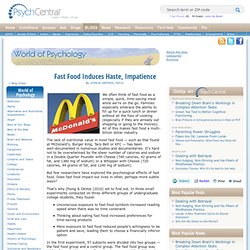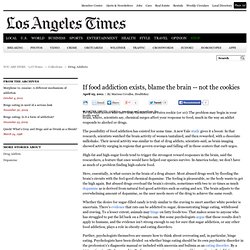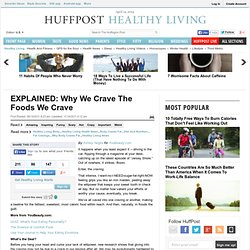

How Long Does It Take Your Brain To Register That The Stomach Is Full? Because your brain doesn't immediately register that your stomach is full, you may be at risk of eating more than your body needs and getting too full if you are prone to eating quickly or on-the-go.

You can reduce your calorie intake if you focus on slowing down and enjoying every bite of food during meals. Your brain and stomach register feelings of fullness after about 20 minutes, mentions Cara Stewart, dietitian and nutritionist, in a "Penn Metabolic & Bariatric News" article. During this time, receptors inform the brain that your body is receiving nutrients by sending hormone signals. The hormone cholecystokinin is released by your intestines and the hormone leptin tells your brain about your long-term needs and overall satiety based on how much energy your body is storing. In a 2008 study published in the "Journal of the American Dietetic Association," 30 healthy women were studied on two separate occasions in which they ate at two different rates. Fast Food Induces Haste, Impatience.
We often think of fast food as a simple, quick, time-saving meal while we’re on the go.

Families especially embrace the ability to fill up for a quick lunch or dinner without all the fuss of cooking (especially if they are already out shopping or going to the movies). All of this makes fast food a multi-billion dollar industry. The lack of nutritional value in most fast food — such as that found at McDonald’s, Burger King, Taco Bell or KFC — has been well-documented in numerous studies and documentaries. It’s hard not to be overwhelmed by the sheer number of calories and sodium in a Double Quarter Pounder with Cheese (740 calories, 42 grams of fat, and 1380 mg of sodium) or a Whopper with Cheese (720 calories, 44 grams of fat, and 1240 mg of sodium).
But few researchers have explored the psychological effects of fast food. That’s why Zhong & DeVoe (2010) set to find out. In the first experiment, 57 subjects were divided into two groups — the fast food group and a control group. Fast Food As Addictive As Heroin, Study Confirms. Food addiction: Blame the brain for food addiction. To the food lovers who can't deny themselves an extra cookie (or 10): The problem may begin in your brain, where, scientists say, chemical surges affect your response to food, much in the way an addict responds to alcohol or drugs.

The possibility of food addiction has existed for some time. A new Yale study gives it a boost. In that research, scientists watched the brain activity of women tantalized, and then rewarded, with a chocolate milkshake. Their neural activity was similar to that of drug addicts, scientists said, as brain imaging showed activity surging in regions that govern cravings and falling off in those centers that curb urges. High-fat and high-sugar foods tend to trigger the strongest reward responses in the brain, said the researchers, a feature that once would have helped our species survive. EXPLAINED: Why We Crave The Foods We Crave. By Ashley Neglia for YouBeauty.com It happens when you least expect it -- driving in the car, flipping through a magazine at your desk, catching up on the latest episode of “Jersey Shore.”

Out of nowhere, it strikes. Boom. Enter, the craving. That intense, I-want-no-I-NEED-sugar-fat-right-NOW feeling grips you like an iron maiden, peeling away the willpower that keeps your sweet tooth in check all day. We’ve all caved into one craving or another, making a beeline for the fattiest, sweetest, most caloric food within reach. More from YouBeauty.com:QUIZ: What's Your Eating Personality? What’s the Deal? “In prehistory, calories were in intermittent supply and very essential for survival,” explains Susan B. In Fred Flintstone’s prehistoric era, high-caloric food was in high demand and in short supply. “Our earlier ancestors were hard-wired to search for sugar, fat and protein,” says Anthony Salerno, a marketing doctoral student who researches survival instincts at the University of Miami.